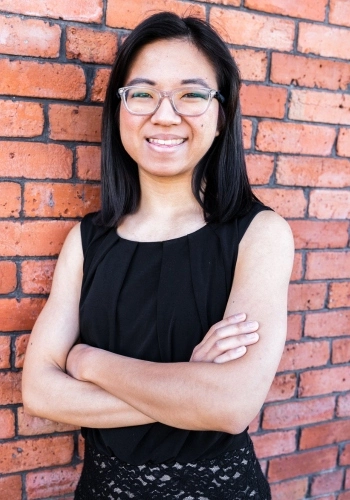In a busy workplace, mental health often takes a backseat. But it doesn’t have to be that way. For Seva Reilly, becoming a Mental Health First Aider has been a transformative tool, enabling her to support her colleagues and community.
“My Mental Health First Aid (MHFA) training has helped me have the courage to ask the question, ‘How are you doing?’ and to deeply listen to the response, to hear what is not said, to create space for sharing and to encourage the people in my life to practice self-care.”
Seva began her journey with MHFA after graduating from the University of Central Florida (UCF) with a bachelor’s degree in communication sciences and disorders. Her experiences supporting others in roles with Aphasia Family UCF and the Autism Spectrum Disorder (ASD) Adult Achievement Center fostered a passion for helping others, leading her to pursue her master’s in social work from UCF.
She’s still early in her career, but Seva quickly realized how workplace mental wellbeing is intricately interwoven through our lives. She observed the challenges her colleagues faced at work and recognized the important role mental health support plays. She discovered that colleagues form a valuable support network, united by shared experiences and understanding of work challenges. Stress, illness and tragedy can affect anyone, and Seva’s MHFA training has allowed her to foster open discussions about mental health at work, providing support during difficult times.

“Oftentimes we see work as a place where we clock in, complete our tasks and go home. With the alarming rates of anxiety, depression and loneliness, MHFA and destigmatization of mental health will help us remember that coworkers are not just the people sitting in adjacent cubicles. The kindness we offer to coworkers can create an environment where people are supported and build resilience among teams. At the managerial level, MHFA empowers organizational leaders and supervisors to recognize when an employee is struggling and suggests strategies for supporting them within a professional relationship. MHFA will also underscore the importance of robust Employee Assistance Programs as part of the company’s resources to support employees.”
Her experience working at Crisis Text Line showed Seva the profound impact of being a compassionate listener and providing a safe space for others to share their experiences: “I’ve seen the power of active listening. Holding nonjudgmental space for others to share their pain and experiences changed the lives of many texters I helped.”
Nonjudgmental, active listening isn’t just for crisis support. It can help in every part of our work lives as well. “In my role as a mentor at the ASD Adult Achievement Center, I learned how supporting my clients often means being a listening ear and creating a safe space where my clients feel they can share not only their worries and concerns, but successes and achievements. Working in a social service agency, my coworkers and I are continually working for the good of others, which can lead us to neglect self-care. My desire to support my coworkers, clients and community was another motivator to complete the Mental Health First Aid training.”
From Seva’s perspective, MHFA isn’t just a training course — it’s about fostering a culture of support. MHFA training helps individuals and organizations recognize stress, burnout and mental health issues, which is particularly important in a society where work and personal life are often intertwined. MHFA fosters a culture where coworkers are not just colleagues but a support network, emphasizing the importance of self-care and building resilience.
For those considering MHFA training, Seva offers a heartfelt suggestion: It’s not just another training course — it’s an empowerment journey.
“There are many mandatory trainings that you’ll have to take in your life that bore you or never translate to your real life. This is certainly not one of those. MHFA empowers learners to be mental health and support advocates. Many people want to support those around them but are afraid of saying the wrong thing. The real danger, though, is in staying silent and doing nothing. Taking MHFA is a first step toward being a ray of hope, light and support in someone else’s life when they go through a dark time.”
Consider getting trained in Mental Health First Aid like Seva. We believe every 1 in 15 people nationwide should be certified to identify, understand and respond to signs and symptoms of mental health and substance use challenges. As a trained First Aider, you’ll join us in that mission. If you’re an employer and would like to learn more about bringing MHFA at Work to your workplace, check out this flyer. And if you’re an employee who would like to encourage your boss to bring MHFA to your workplace, we can help. Use this editable email template, filled with everything you need to help get them on board.